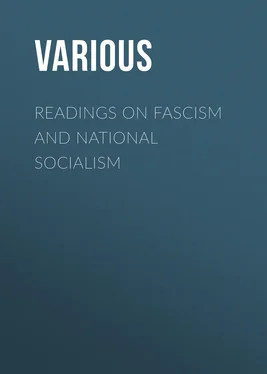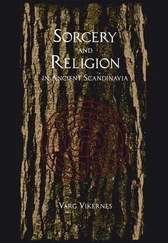Various - Readings on Fascism and National Socialism
Здесь есть возможность читать онлайн «Various - Readings on Fascism and National Socialism» — ознакомительный отрывок электронной книги совершенно бесплатно, а после прочтения отрывка купить полную версию. В некоторых случаях можно слушать аудио, скачать через торрент в формате fb2 и присутствует краткое содержание. Жанр: foreign_edu, Политика, на английском языке. Описание произведения, (предисловие) а так же отзывы посетителей доступны на портале библиотеки ЛибКат.
- Название:Readings on Fascism and National Socialism
- Автор:
- Жанр:
- Год:неизвестен
- ISBN:нет данных
- Рейтинг книги:4 / 5. Голосов: 1
-
Избранное:Добавить в избранное
- Отзывы:
-
Ваша оценка:
- 80
- 1
- 2
- 3
- 4
- 5
Readings on Fascism and National Socialism: краткое содержание, описание и аннотация
Предлагаем к чтению аннотацию, описание, краткое содержание или предисловие (зависит от того, что написал сам автор книги «Readings on Fascism and National Socialism»). Если вы не нашли необходимую информацию о книге — напишите в комментариях, мы постараемся отыскать её.
Readings on Fascism and National Socialism — читать онлайн ознакомительный отрывок
Ниже представлен текст книги, разбитый по страницам. Система сохранения места последней прочитанной страницы, позволяет с удобством читать онлайн бесплатно книгу «Readings on Fascism and National Socialism», без необходимости каждый раз заново искать на чём Вы остановились. Поставьте закладку, и сможете в любой момент перейти на страницу, на которой закончили чтение.
Интервал:
Закладка:
Regimes can be called democratic which, from time to time, give the people the illusion of being sovereign, whereas the real and effective sovereignty exists in other, and very often secret and irresponsible forces.
Democracy is a regime without a king, but very often with many kings, far more exclusive, tyrannical and ruinous than a single king, even if he be a tyrant. This explains why Fascism which, for contingent reasons, had assumed a republican tendency before 1922, renounced it previous to the March on Rome, with the conviction that the political constitution of a State is not nowadays a supreme question; and that, if the examples of past and present monarchies and past and present republics are studied, the result is that neither monarchies nor republics are to be judged under the assumption of eternity, but that they merely represent forms in which the extrinsic political evolution takes shape as well as the history, the tradition and the psychology of a given country.
Consequently, Fascism glides over the antithesis between monarchy and republic, on which democraticism wasted time, blaming the former for all social shortcomings and exalting the latter as a regime of perfection. We have now seen that there are republics which may be profoundly absolutist and reactionary, and monarchies which welcome the most venturesome social and political experiments.
"Reason and science" says Renan (who had certain pre-fascist enlightenments) in one of his philosophical meditations, "are products of mankind, but to seek reason directly for the people and through the people is a chimera. It is not necessary for the existence of reason that everybody should know it. In any case if this initiation were to be brought about it could not be through low-class democracy, which seems to lead rather to the extinction of every difficult culture and of every great discipline. The principle that society exists only for the welfare and liberty of individuals composing it, does not seem to conform with the plans of nature: plans in which the species only is taken into consideration and the individual appears sacrificed. It is strongly to be feared that the last word of democracy thus understood (I hasten to add that it can also be differently understood) would be a social state in which a degenerated mass would have no preoccupation other than that of enjoying the ignoble pleasures of the vulgar person."
Thus Renan. In Democracy Fascism rejects the absurd conventional falsehood of political equality, the habit of collective responsibility and the myth of indefinite progress and happiness.
But if there be a different understanding of Democracy if, in other words, Democracy can also signify to not push the people back as far as the margins of the State, then Fascism may well have been defined by the present writer as "an organised, centralised, authoritarian Democracy."
As regards the Liberal doctrines, the attitude of Fascism is one of absolute opposition both in the political and in the economical field. There is no need to exaggerate the importance of Liberalism in the last century—simply for the sake of present-day polemics—and to transform one of the numerous doctrines unfolded in that last century into a religion of humanity for all times, present and future. Liberalism did not flourish for more than a period of fifteen years. It was born in 1830 from the reaction to the Holy Alliance which attempted to set Europe back to the period which preceeded '89 and had its years of splendour in 1848, when also Pius IX was a Liberal. Its decadence began immediately afterwards. If 1848 was a year of light and poesy, 1849 was a year of weakness and tragedy. The Roman Republic was killed by another Republic, the French Republic. In the same year Marx issued his famous manifesto of Communism. In 1851 Napoleon III made his anti-Liberal coup d'état and reigned over France until 1870. He was overthrown by a popular movement, following one of the greatest defeats registered in history. The victor was Bismarck, who always ignored the religion of liberty and its prophets. It is symptomatic that a people of high civilisation like the Germans completely ignored the religion of liberty throughout the whole Nineteenth Century—with but one parenthesis, represented by that which was called "the ridiculous parliament of Frankfurt" which lasted one season. Germany realised its national unity outside of Liberalism, against Liberalism—a doctrine which seemed alien to the German spirit essentially monarchical, since Liberalism is the historical and logical ante-chamber of anarchy.
The three wars of 1864, 1866 and 1870 conducted by "Liberals" like Moltke and Bismarck mark the three stages of German unity. As for Italian unity, Liberalism played a very inferior part in the make-up of Mazzini and Garibaldi, who were not liberals. Without the intervention of the anti-Liberal Napoleon we would not have had Lombardy, and without the help of the anti-Liberal Bismarck at Sadowa and Sedan it is very likely that we would not have got Venice in 1866, or that we would have entered Rome in 1870.
During the period of 1870-1915 the preachers of the new Credo themselves denounced the twilight of their religion; it was beaten in the breach by decadence in literature. It was beaten in the open by decadence in practice. Activism: that is to say, nationalism, futurism. Fascism.
The "Liberal Century" after having accumulated an infinity of Gordian knots, sought to cut them in the hecatomb of the World War. Never did any religion impose such a terrible sacrifice. Have the gods of Liberalism slaked their blood-thirst?
Liberalism is now on the point of closing the doors of its deserted temples because nations feel that its agnosticism in the economic field and its indifference in political and moral matters, causes, as it has already caused, the sure ruin of States. That is why all the political experiences of the contemporary world are anti-Liberal, and it is supremely silly to seek to classify them as things outside of history—as if history were a hunting ground reserved to Liberalism and its professors; as if Liberalism were the last and incomparable word of civilisation.
The Fascist negation of Socialism, of Democracy, of Liberalism, should not lead one to believe that Fascism wishes to push the world back to where it was before 1879, the date accepted as the opening year of the demo-Liberal century. One cannot turn back. The Fascist doctrine has not chosen De Maistre for its prophet. Monarchical absolutism is a thing of the past, and so is the worship of church power. Feudal privileges and divisions into impenetrable castes with no connection between them, are also "have beens." The conception of Fascist authority has nothing in common with the Police. A party that totally rules a nation is a new chapter in history. References and comparisons are not possible. From the ruins of the socialist, liberal and democratic doctrines, Fascism picks those elements that still have a living value; keeps those that might be termed "facts acquired by history," and rejects the rest: namely the conception of a doctrine good for all times and all people.
Admitting that the Nineteenth Century was the Century of Socialism, Liberalism and Democracy, it is not said that the Twentieth century must also be the century of Socialism, of Liberalism, of Democracy. Political doctrines pass on, but peoples remain. One may now think that this will be the century of authority, the century of the "right wing" the century of Fascism. If the Nineteenth Century was the century of the individual (liberalism signifies individualism) one may think that this will be the century of "collectivism," the century of the State. It is perfectly logical that a new doctrine should utilise the vital elements of other doctrines. No doctrine was ever born entirely new and shining, never seen before. No doctrine can boast of absolute "originality." Each doctrine is bound historically to doctrines which went before, to doctrines yet to come. Thus the scientific Socialism of Marx is bound to the Utopian Socialism of Fourier, of Owen, of Saint-Simon; thus the Liberalism of 1800 is linked with the movement of 1700. Thus Democratic doctrines are bound to the Encyclopaedists. Each doctrine tends to direct human activity towards a definite object; but the activity of man reacts upon the doctrine, transforms it and adapts it to new requirements, or overcomes it. Doctrine therefore should be an act of life and not an academy of words. In this lie the pragmatic veins of Fascism, its will to power, its will to be, its position with regard to "violence" and its value.
Читать дальшеИнтервал:
Закладка:
Похожие книги на «Readings on Fascism and National Socialism»
Представляем Вашему вниманию похожие книги на «Readings on Fascism and National Socialism» списком для выбора. Мы отобрали схожую по названию и смыслу литературу в надежде предоставить читателям больше вариантов отыскать новые, интересные, ещё непрочитанные произведения.
Обсуждение, отзывы о книге «Readings on Fascism and National Socialism» и просто собственные мнения читателей. Оставьте ваши комментарии, напишите, что Вы думаете о произведении, его смысле или главных героях. Укажите что конкретно понравилось, а что нет, и почему Вы так считаете.












